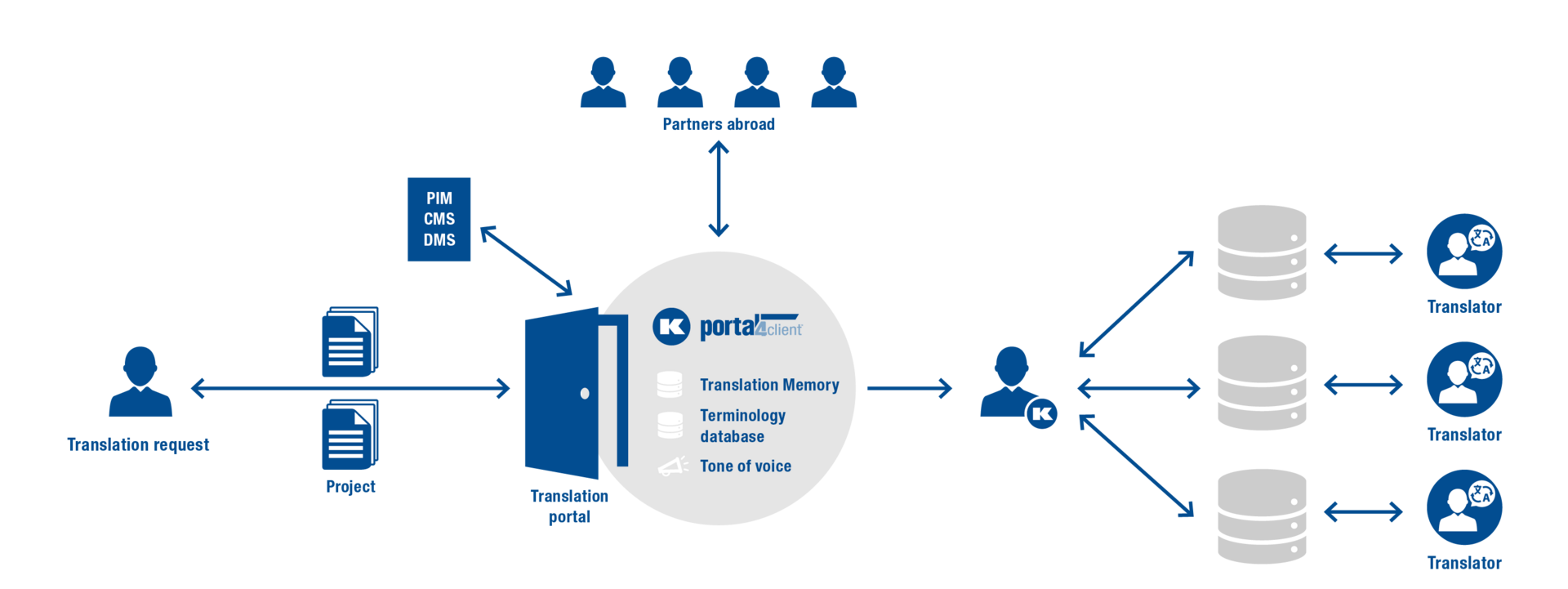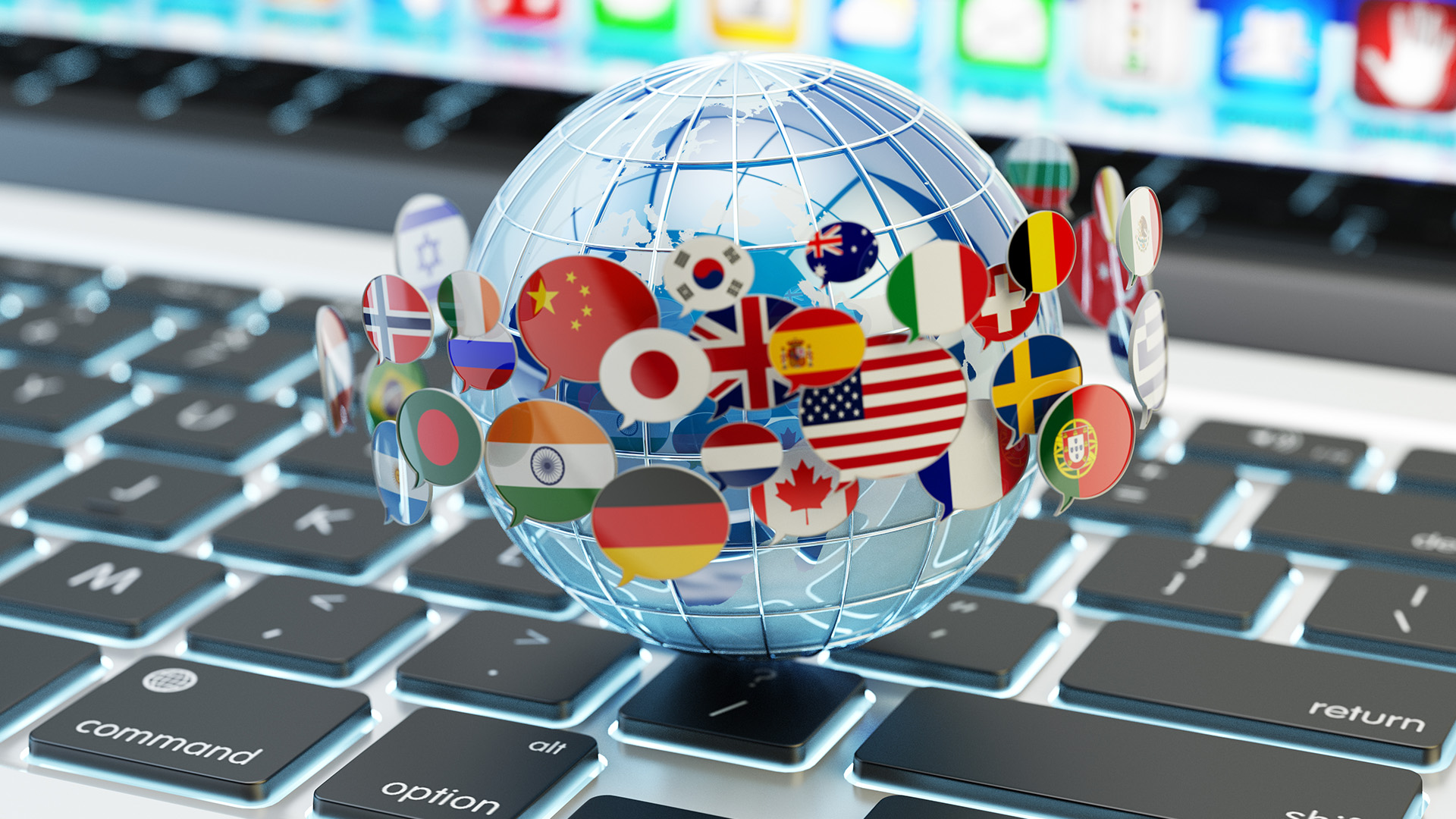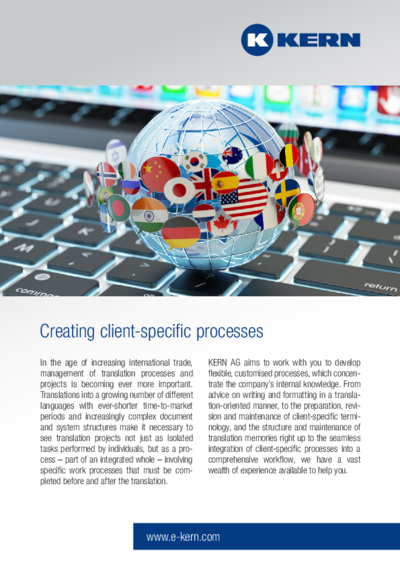
Establishing customer-specific translation processes
In times of international trade, translation process management and project management are becoming ever more important. Translations into a growing number of different languages with ever-shorter time-to-market periods and increasingly complex document and system structures make it necessary to see translation projects not just as isolated tasks performed by individuals, but as a process – part of an integrated whole – involving specific work processes that must be completed before and after the translation.
It is KERN's objective to develop flexible, customised processes with you that will concentrate your company's internal knowledge. From advice on writing and formatting in a translation-oriented manner, to the preparation, revision and maintenance of customer-specific terminology and the creation and maintenance of translation memory databases, right up to the seamless integration of customer-specific processes into a comprehensive workflow, KERN has a vast wealth of experience available to assist you.

Process specifications and creation
To shape a holistic translation process, one first has to record and analyse the existing internal processes of the customer. All those involved in the internal processes should participate in this analysis, which determines the standard procedure for the creation of translations. The workflow and specific process specifications should be documented.
The objective is to improve processes whilst taking the existing organisational structures into consideration, and thus to make the creation of consistent foreign-language documentation for the introduction of new products more reliable. Key factors to be considered here are the way in which data is transferred between translation, editing, product information, media, content management and document management systems as well as questions related to the creation of consistent source texts and a uniform layout that takes into account the different text lengths in the target languages. The content of terminology lists and translations should be coordinated with the employees and foreign partners to guarantee the seamless adoption of these specifications into the integrated terminology and translation memory databases.
We can assist you if original texts and translations have to be created in parallel because the original cannot be completed in advance due to its size. A standardised translation process also allows us to plan updates to existing instruction manuals and other technical documents and to implement them without delays caused by missing interfaces or media disruptions.
Editorial guidelines
The joint development of editorial guidelines provides additional support for internal and external employees. The guidelines contain all the internal directives and stipulations that those involved in the creation of the documents must observe. Among other things, the guidelines establish linguistic specifications regarding terminology and syntax; design specifications such as typography, layout and the use of graphics; and aspects of corporate identity such as logos, in-house fonts and areas of responsibility.
As a result, the documents created are not only more consistent, but the overall public image of a company is shaped by this homogeneity, as well.
Project management
The efficient translation process is a key component of the customer-oriented project management at KERN. From arranging orders to maintaining language databases, project managers will create a detailed project schedule in collaboration with you.
At the beginning of a translation project, we will select a suitable project manager to keep you informed about the status of your project at all times. He or she will plan, budget and coordinate all aspects of the project.
Your dedicated project manager coordinates the entire translation project with you and our specialist translators, proofreaders, graphic designers, etc.
Project preparation
As a customer, you can even help us in advance to ensure that we carry out your translation order to your complete satisfaction.
Plan in advance
The time it takes to process a translation depends upon the length and difficulty of the text, the desired language combination and the quality of the manuscript. Please bear in mind that a professional specialist translator can translate a maximum of 10 to 15 pages per day on average. In the case of difficult texts and uncommon languages, translators accordingly need more time.
When choosing your desired delivery date, please consider the increased workload and time required for additional work, e.g. for text adaptation, proofreading, foreign-language typesetting, editing, graphic design, printing, etc.
Please submit all details when placing an order, e.g.
- the desired language combination
- the target country of the translation
- whether the translation is to be certified by a sworn translator
- whether the translation is to be published
- any requests in terms of formatting and conversion, as well as which end product you require
Translation aids
Provide KERN with translation aids such as glossaries, reference material and parallel texts that enable our translators to work more efficiently when producing specialised translations.
Wording suitable for translation
The translation process does not only begin when handing over documents to KERN, but rather when the documents themselves are created. When creating a document, you can avoid potential translation problems in the source language by using wording that is suitable for translation. If the possible translation has not been taken into account, texts may
- require a great effort on the part of the translator, both in terms of understanding the facts
and possible additional research work as well as - higher translation and layout costs due to expensive correction and formatting work can result.
Moreover, source documents that are suitable for translation facilitate the efficient use of translation software such as translation memory systems. Last but not least, the time taken to process and create your multilingual documents will be significantly reduced.
In the creation process, a documented should be phrased and designed in a culturally neutral manner where possible. This includes formalities such as the use of culturally neutral non-verbal means of communication, e.g. internationally recognised pictograms and mostly refraining from using idiomatic expressions. Furthermore, you have to bear in mind that the target text can become considerably longer than the source text with certain language combinations.
Proposals for rules
When creating your documents, the rules that you should observe concerning wording suitable for translation can be summarised as follows:
- Language-neutral formatting
- A defined meaning for every word
- No use of synonyms for technical terminology
- Explanation of new terms and abbreviations
- No filler words, no complex sentence structures, support direct requests through syntax
- Adherence to a logical order (first cause, then effect)
- Tense: Present tense
- One call for action per sentence
- Use of culturally neutral illustrations
Translation team
The highly qualified KERN translation team has many years of experience in translating texts from one language into their particular native language.
As a rule, KERN translators have the following educational and practical backgrounds:
- Training and qualifications as a translation graduate with a university-level education in foreign languages (4 to 5 years)
- Linguist with a university-level education in one or two foreign languages (4 to 5 years)
- Bachelor's or master's degree
- State-authorised/certified translator (state examination, 2 to 3 years)
Practical experience:
- Translation experience of at least 4 years
- Specialisation in one or more areas of expertise (e.g. economics, technology, law, etc.) A detailed list of areas of expertise can be found here.
- Certain translators have taken an oath before a court and may certify translations.
- Further training in the use of software and tools.
KERN's specialist translators only translate into their native language:
- KERN's founding principle for over 50 years
We are happy to help

We are there for you Monday to Friday from 8:00 AM to 7:00 PM.
Phone: 0207 831 5600
Email: kern.london@e-kern.com
Creating client specific processes
KERN's translation team optimises your entire translation workflow with individual translation processes. You can download our info sheet "Developing customer-specific processes" here.


Language Courses